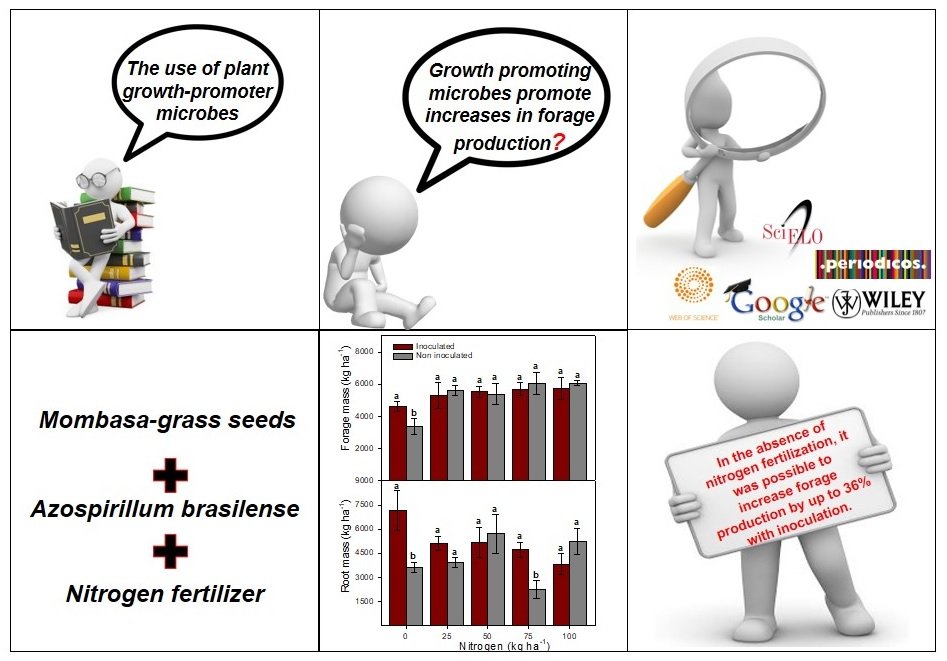Mitigation of Mombasa Grass ( Megathyrsus maximus ) Dependence on Nitrogen Fertilization as a Function of Inoculation with Azospirillum brasilense
20/Aug/2019
ABSTRACT Using biological inputs to improve the efficiency of nitrogen fertilizers represents an alternative for the cultivation of grasses in tropical regions. Azospirillum brasilense is a species of plant growth promoting bacteria widely studied and used in inoculants. Thus, this study aimed to evaluate the performance of Mombasa grass ( Megathyrsus maximus ) in association with A. brasilense and nitrogen (N) fertilization. The study was conducted under field conditions in Araguaína-Tocantins State, between December 2017 and May 2018. The treatments […]
Bradyrhizobium spp. Strains in Symbiosis with Pigeon Pea cv. Fava-Larga under Greenhouse and Field Conditions
09/Dec/2016
ABSTRACT: Optimization of symbiosis between nitrogen-fixing bacteria and legumes has been extensively studied, seeking agricultural sustainability. To evaluate the symbiotic efficiency of nitrogen-fixing bacterial strains belonging to the Bradyrhizobium genus with pigeon pea (Cajanus cajan (L.) Millsp.) cv. Fava-Larga, experiments were conducted in Leonard jars (axenic conditions), pots with soil, and in the field. Ten strains were tested in Leonard jars, and three strains, in addition to BR 29, were selected according to their ability to promote the growth of […]
THE RESURRECTION PLANT TRIPOGON SPICATUS (POACEAE) HARBORS A DIVERSITY OF PLANT GROWTH PROMOTING BACTERIA IN NORTHEASTERN BRAZILIAN CAATINGA
01/Jul/2015
Plant species that naturally occur in the Brazilian Caatinga (xeric shrubland) adapt in several ways to these harsh conditions, and that can be exploited to increase crop production. Among the strategic adaptations to confront low water availability, desiccation tolerance stands out. Up to now, the association of those species with beneficial soil microorganisms is not well understood. The aim of this study was to characterize Tripogon spicatus diazotrophic bacterial isolates from the Caatinga biome and evaluate their ability to promote […]
Inoculation of sugarcane with diazotrophic bacteria
01/Apr/2014
The sugarcane industry, a strategic crop in Brazil, requires technological improvements in production efficiency to increase the crop energy balance. Among the various currently studied alternatives, inoculation with diazotrophic bacteria proved to be a technology with great potential. In this context, the efficiency of a mixture of bacterial inoculant was evaluated with regard to the agronomic performance and N nutrition of sugarcane. The experiment was carried out on an experimental field of Embrapa Agrobiologia, in Seropédica, Rio de Janeiro, using […]
Nodulation and nitrogen fixation efficiency of cowpea as affected by inoculum rate
01/Nov/2012
Cowpea (Vigna unguiculata (L.) Walp.) can obtain sufficient N for its own supply from the atmosphere, by the process of biological nitrogen fixation (FBN), when associated with specific and effective rhizobia bacteria. The purpose of this study was to evaluate the effect of different rhizobia inoculum rates on nodulation and biological N fixation by cowpea (cv. BRS Pujante). A complete randomized block design with seven treatments and four replicates was used. The trial was conducted in a greenhouse using 2 […]
Diversity and symbiotic capacity of bacteria isolated from nodules of two velvet bean species
01/Apr/2012
Mucuna species are widely used as green manure, and little information is available about rhizobia that can nodulate them. The objective of this study was to evaluate the diversity and ability of bacteria isolated from symbiotic nodules of velvet bean (Mucuna pruriens (L.) DC.) and Mucuna deeringiana (Bort.) Merr. From the nodules of either mucuna species, grown in pots with soils from an agroecological system, 80 bacteria were isolated. The selected bacteria were classified and used to assess the symbiotic […]
Growth promotion of pineapple ‘vitória’ by humic acids and burkholderia spp. during acclimatization
01/Oct/2010
In vitro propagation of pineapple produces uniform and disease-free plantlets, but requires a long period of acclimatization before transplanting to the field. Quicker adaptation to the ex vitro environment and growth acceleration of pineapple plantlets are prerequisites for the production of a greater amount of vigorous, well-rooted planting material. The combination of humic acids and endophytic bacteria could be a useful technological approach to reduce the critical period of acclimatization. The aim of this study was to evaluate the initial […]
In-furrow inoculation of soybean as alternative to fungicide and micronutrient seed treatment
01/Aug/2010
Soybean is a major grain crop in Brazil, and yields can be considerably improved by inoculation with selected Bradyrhizobium strains. However, the incompatibility between inoculation and seed treatments with fungicides and micronutrients represents a major barrier to the achievement of high rates of biological N2 fixation. Inoculation practices that can alleviate the negative effects of agrochemicals must therefore be found and in-furrow inoculation seems to be an attractive alternative. This study reports the results of seven field experiments conducted in […]
Phosphate solubilizing microorganisms and the growth of pine and eucalypt
01/Dec/2002
Phosphate solubilizing microorganisms play an important role in supplying phosphorous to plants. This ability has stimulated research on plant inoculation. In our study, microorganisms were isolated from Pinus and Eucalyptus plantations and selected in culture medium. They were then employed in a series of 28 experiments under greenhouse conditions in substrate, forest or sterilized nursery soil, with or without phosphate fertilization, in one of the following P forms: calcium phosphate, Araxá, or Catalão phosphate. Three isolates promoted a higher dry […]
Effects of concentrations of sugar cane solution on the adhesion of peat-based inoculant to the seeds, on the nodulation and soybean yield
01/Sep/2000
Soybean [Glycine max (L.) Merrill] plants establish a symbiosis with bacteria belonging to the genus Bradyrhizobium, realizing the biological N2 fixation process. The inoculation with selected rhizobial strains guarantees the maximization of the biological process. In Brazil, almost 13 million doses of inoculants, mainly peat based, are commercialized annually. However, the peat adhesion to the soybean seeds is low, requiring the use of adhesives. The current recommendation is the use of a water sugar cane solution at 25%, but this […]

